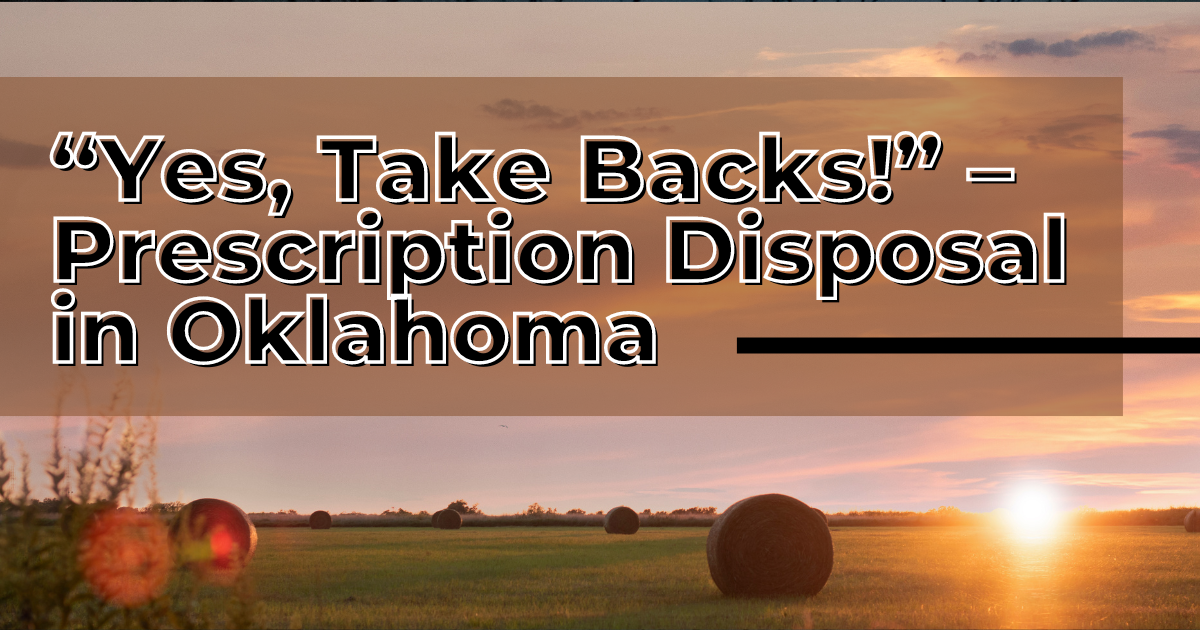“Yes, Take Backs!” – Prescription Disposal in Oklahoma
Since its inception in 2011, the Oklahoma Bureau of Narcotics’s (OBN) Rx Take Back Program has provided citizens with safe and controlled ways to dispose of their unwanted, expired or extra prescription medications. The National Institute of Drug Abuse (NIDA) has reported that 75% of those who abuse heroin got their first taste of opioids from someone they knew with a prescription. Usually, the opioid was a prescription pill. This is why it’s so important to dispose of extra pills and drugs appropriately.
How Does the Rx Take Back Program Work?
The OBN Rx Take Back Program can either directly facilitate or help Oklahomans dispose of needles, opioids, unused antibiotics, and inhalers to prevent their abuse. For non-pill take backs, the program makes use of existing infrastructure created by partnered advocacy programs like the Oklahoma Harm Reduction Alliance (OKHRA). In the state of Oklahoma, the OBN operates 184 drug disposal boxes in 77 counties and hosts take back events in various locations regularly.
Each of the state’s take back boxes are secured in law enforcement agency offices to ensure safe and secure disposal. Once the drugs are securely received, they are shipped off by law enforcement and recycled through a clean energy process in Tulsa, OK. This process ensures drugs don’t end up polluting the environment via sewers or dumps. The Drug Enforcement Agency (DEA) organizes a yearly national drug take back day, with this year’s take back day falling on October 29, 2022.
How Effective Are Drug Take Backs in Oklahoma?
In a report by Fox 25, a local Oklahoma news station, Mark Woodward of the OBN reports that they’ve collected “over 100,000 pounds [of pharmaceuticals] in the last eleven years.” The program has been a huge success in protecting the environment and getting drugs off the streets all over the state.
Woodward continued, “It’s not going down the water tables and being flushed. It’s being destroyed safely and being converted to clean energy at Covanta Energy in Tulsa.”
Why Are Drug Take Back Programs Important in Cracking Down On Prescription Misuse?
Many of those who keep extra prescriptions around the house are unwittingly putting themselves, friends or family members at risk for developing an addiction. Many cases of substance use disorders begin when someone has access to an acquaintance’s supply of pharmaceuticals. In 2017, SAMHSA reported that just over half of those abusing prescription painkillers were getting their supply from a friend or relative for free. The goal with take back programs is to move people from “no take backs” to “yes take backs.”
Learn More
To learn more about how Landmark Recovery of Oklahoma City treats those with substance use disorders, give us a call at (405) 265-8477 today. Landmark Recovery’s goal is to save a million lives in the next century, starting with those in our very own Oklahoma backyard. With evidence-based treatment methods, Landmark is on a mission to help those in Oklahoma unlock their potential.

Choose Recovery Over Addiction
We're here 24/7 to help you get the care you need to live life on your terms, without drugs or alcohol. Talk to our recovery specialists today and learn about our integrated treatment programs.




